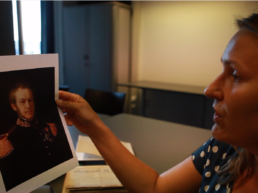Two reflective texts setting out the perspectives of the authors on their positions in academic research and research journalism. Maartje Janse reflects on the process of co-creation which led to this publication. Anne-Lot Hoek sets out her position as a research journalist and how she got engaged in the topic of colonialism in Indonesia.
A process of co-creation
“Two years ago I wondered: How can we give voice to those historical actors who are long gone?” Initiator of the project, Historian Maartje Janse, reflects on the process of co-creation that followed her decision to introduce the story of Willem Bosch to a wider audience. Bosch was one of the first outspoken critics of the colonial regime in the Dutch East Indies (present day Indonesia) in the 19th century but has not received much attention. Maartje rewrote his life story in a comprehensive and digital format and invited Ernst Jansz (a musician), Anne-Lot Hoek (a journalist), and Sjoerd Sijsma (a filmmaker) to reflect on it. This resulted in a cross-disciplinary project that investigates the historical development of voices of protest against colonialism.
Research journalism and the need for dissenting sources
Anne-Lot Hoek wrote a personal reflection on becoming involved in the subject of the decolonization of Indonesia and Dutch colonialism as a research journalist. Trained as a historian she started writing for a public debate in 2012, after she watched the Dutch news broadcast NOS about the successful civil case that activist Jeffry Pondaag and lawyer Liesbeth Zegveld had filed against the Dutch state concerning its crimes in Indonesia. Hoek argues that research journalism can be useful in digging up uncomfortable historical truths and that giving voice to the unheard is essential in this process. Audio-visual sources from her fieldwork are added to illustrate this.


